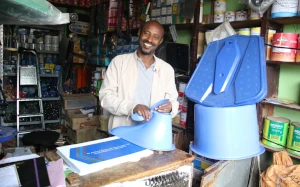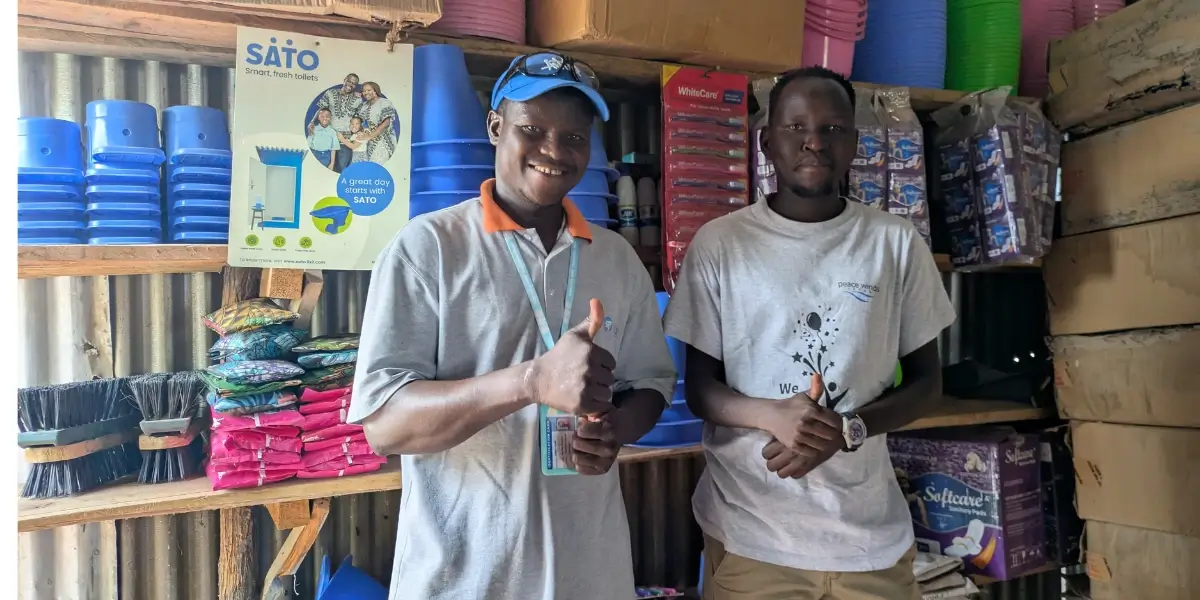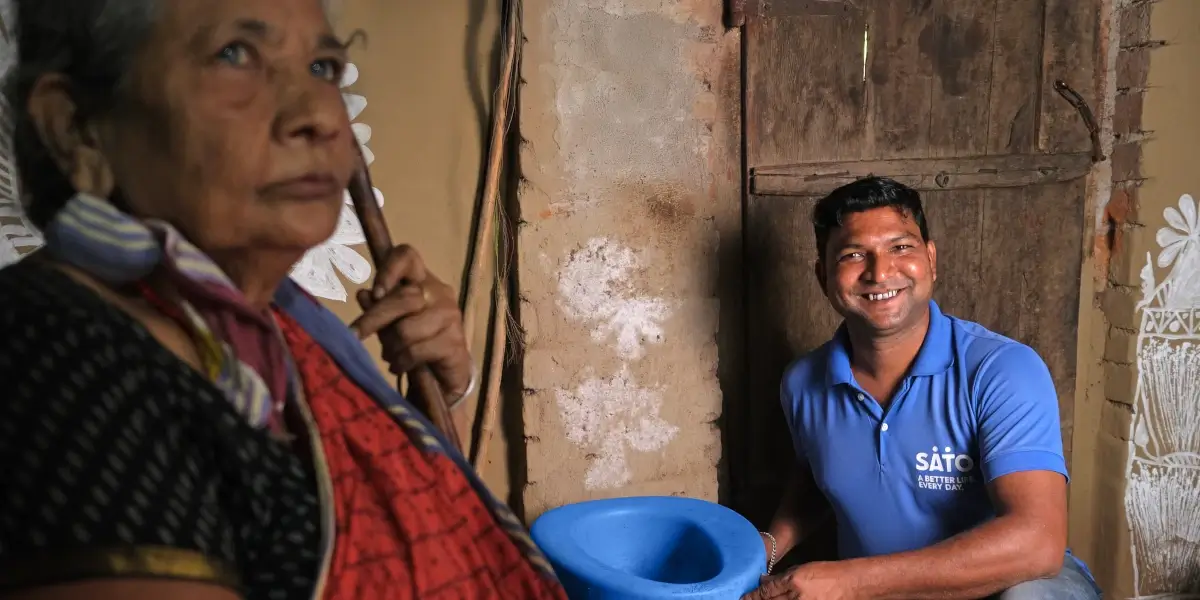
Improving the lives of one million Ethiopians by partnering with PSI

By Eyerusalem Taye
As we continue to work hard to develop sanitation markets across the world, we are pleased to see countries and consumers who remain extremely driven to change their lives through sanitation and hygiene. In few places this is clearer than in Ethiopia.
An incredibly historic and diverse country, which is home to over 120 million people, roughly 40% of which are below the age of 14 years[1], and about 88 different languages[2], our efforts to change Ethiopian lives for the better through our innovative products have so far been met with incredible consumer enthusiasm.
After launching in the market in 2017, today our products can be found in every single one of the 0country’s regions outside of Addis Ababa, the capital city. Through our ‘Transform WASH’ (TWASH) partnership with Population Services International (PSI), together we have so far put 162,000 pans directly into the hands of Ethiopians, improving over 970,000 lives in the process.
However, our SATO products don’t just add social value, they also create economic value, generating income and creating local jobs through ongoing maintenance and installation efforts. Our partnership has so far subsequently seen us train 420 stockists and masons with our products – laying the groundwork for a durable and sustainably managed sanitation and hygiene economy to continue to grow across the country.
So, how have we achieved this?
Working alongside the PSI team in Ethiopia and globally, we have seen huge benefits from partnerships with local business and engaging local masons to create agents of positive change across the country. By identifying and developing regional wholesalers and approaching them with products at competitive price, we have successfully driven higher volume sales of our life-changing products. This strategy has shown two clear benefits. Whilst a higher volume of sales has increased the reach of our products’ impact, our targeting of wholesalers has also ensured a more affordable product that is available where Ethiopian consumers are.
Furthermore, our highly engaging and successful training campaigns for local masons has driven door-to-door sales of our products, subsequently increasing awareness through word-of-mouth. Meanwhile, our partner on the ground, PSI, has also partnered with the Ethiopian Government to create a standardised vocational training for masons, spreading awareness of best practice techniques and methods. Our experience tells us that putting effective and affordable products in the hands of well-trained masons is a potent recipe for sustained sanitation and hygiene solutions, and education plays a huge role in this.
Partnerships such as ours are crucial to improving sanitation and hygiene in underserved communities, such as those in Ethiopia, because they leverage the expertise and resources of the non-profit and private sectors. By combining the power of our innovative products and our research and development capabilities with PSI’s community engagement, as well as educational and outreach capacity, partnerships like these are crucial to creating a holistic approach to implementing long-lasting and effective sanitation and hygiene solutions.
Therefore, whilst our work has showed strong promise so far, we are consolidating our efforts to drive even more impact.
As we continue to focus on retrofitting and upgrading previous systems, turning open pits into much safer, more pleasant, and accessible closed pits with our water-seal technology, we are looking to expand our offering in the market. Our most popular product has so far been our award-winning SATO Pan, followed closely by the SATO Stool and SATO Flex. However, we are yet to truly launch our full range of products commercially into the market, which is planned to take place in the coming months.
An expansion of our offering therefore represents an opportunity to add to our already popular portfolio, allowing Ethiopian consumers to build long-lasting end-to-end systems for sustainably managed sanitation, using our products to upgrade their systems in a modular way. Early indications and market testing has already shown that there is significant viability for additional products to be installed in schools. These include the SATO Slab, which has recently undergone
market trails and showed extremely positive preliminary results, the I-Trap and V-Trap, and the Pit Liner, which will all be available in early 2024. Together, this suit of products will go a long distance in delivering long-term sanitation and hygiene solutions directly to Ethiopian consumers.
As we look to the future, we are determined to scale the positive groundwork we have laid in Ethiopia. Collaboration will be key to driving our continued success. Whether it is with NGOs or Government Ministries, or our long-standing partner PSI, we need to pool our resources with other sanitation and hygiene champions to get even more of our products into the hands of Ethiopian consumers who will benefit from them most.
We are always keen to hear from our partners, so we asked Michael Negash, Chief of Party, USAID Transform WASH, PSI Ethiopia, what our partnership meant to him and to describe the progress it has made in expanding sanitation services across the country.
“Our partnership with SATO is a compelling example of the potential of collaboration to achieve positive change. Through USAID Transform WASH activity, PSI Ethiopia is working to expand safely managed sanitation throughout Ethiopia, leveraging SATO’s commitment to providing high-quality, affordable sanitation products and Transform WASH’s efforts to create a market for these products. Together, by training more than 480 entrepreneurs and masons in installation and business skills, we have already helped more than one million people by expanding access to vital sanitation services, and we don’t intend on stopping now.”
We know that SATO and our innovative products are a powerful tool for combating issues of sanitation and hygiene in Ethiopia. Demand for our products is extremely high and it continues to grow. As more and more Ethiopians witness the multi-dimensional benefits that SATO provides, we know we can compound on our successes to date.
By expanding our offering and increasing supply, we can continue to create opportunities to unleash social potential throughout the country, even in the capital, for years to come.
[1] Statista (2023). Ethiopia: Age structure from 2011 to 2021
[2] World Population Review. What Languages do People Speak in Ethiopia?
WANT TO STAY UP TO DATE?
Subscribe to our newsletter to stay on top of the latest news, views, and stories from on the ground.
The easiest way to do this is to sign-up for our LinkedIn newsletter here. We'll then send you a bi-monthly letter from our Leader, Erin McCusker.

Similar articles
While global in scope our stories are local at heart.



 Copyright © LIXIL 2026
Copyright © LIXIL 2026